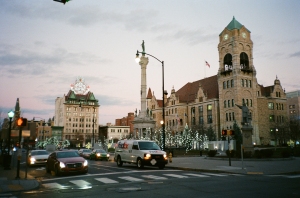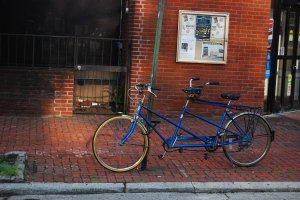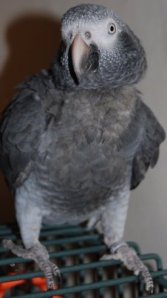By Gerard Nolan

Grandma had been talking about visiting South Dakota since Sacha and I were children. She had long claimed that Lakota blood flowed through our veins, and what better way to get to our roots than visiting the state. Grandma had set foot in the larger of the Dakotas once before, when she and Grandpa, who died three years ago, trekked to Mt. Rushmore and then camped in Badlands National Park on their honeymoon in the 1950s.
On an end table in her living room sat a photo of the two of them in front of the rock wall that encircled the park. Rendered in Kodachrome vibrancy, Grandpa stands erect, appearing reedy in a brown canvas jacket, binoculars looped around his neck. Attired in a jean jacket, Parisian scarf, and sunglasses, Grandma beams a smile that’s familiar to me. She looks a little like Audrey Hepburn. The rock face gleams gold behind them in the low sun, its pinnacles soaring above the couple like the crenellations of an ancient castle.
For several months, Grandma had been calling me late at night. Sometimes I could hardly hear her on her landline phone, its coiled cord twisting to produce noise on the line.
“Gary, it’s Grandma… Can you take me to South Dakota?” she asked. She sounded like a frightened bird.
“Of course, Grandma,” I always replied. “How does early September sound?”
“Yippie! I’ll have my bags packed!” she would exclaim.
Grandma always said she would have her bags packed. She probably had them packed for months and just forgot. I purchased the airfare six months ago at my wife, Anna’s, urging.
The night before the trip, Anna asked me whether we should remind Grandma once again.
“No,” I said. “She’ll remember.”
***
The next morning Anna and I, along with Sacha, drove to Grandma’s building a few towns over. As we rolled up, she stood on the curb and shouldered a quilted tote with a rolling suitcase by her side. I’ll admit, she always looked so stylish, and this fall afternoon proved no exception. She wore white jeans and a turquoise sweater, her satin hair neatly drawn into a bob instead of her usual longer layered look.
“Sach!” Grandma chirped as soon as we pulled up to the curb in front of her building. “You’re coming, too?”
“The motherland is calling me home, Grandma!” Sacha said.
Anna and I got out of the car to help Grandma with her luggage.
“Hi, Grandma,” Anna said as she gave Grandma a hug and a kiss. “I’m so excited we’re finally taking this trip.”
“Me too, sweetie,” Grandma said.
“Nice haircut, Grandma,” I said.
“Thanks, Gar, I thought it was time for a change.”
I stowed Grandma’s bag and suitcase in the trunk as Anna helped Grandma into the front seat. Anna sat in the back with Sacha. I fired up the engine and we were off.
***
We landed in Rapid City, South Dakota, at the eastern edge of the famed Black Hills. Sacha played “Rocky Racoon” by the Beatles in the rental car as we drove past endless grasslands. I wondered about how many species of grass exist and whether they’re all extant here in the Mt. Rushmore State.
Paul McCartney crooned, Now somewhere in the black minin’ hills of Dakota / There lived a young boy named Rocky Raccoon.
Grandma said she loved The Beatles but Sinatra for her money was the best.
“What is this song even about?” I asked.
Sacha said it was a ballad of the American Frontier.
“By a Beatle?” I asked.
“Ah yes, just some lads from Liverpool, the fab four,” she replied in mock Scouse.
“Nice accent, Sach,” I said.
“Thank you,” Sacha replied brightly.
Anna rolled her eyes and cranked up the volume and smiled. I glanced in the driving mirror to catch Grandma and Sacha shimmying in the backseat to the song’s ragtime piano solo.
Anna is afraid of driving long distances, and I get car sick unless I drive, so we came to an arrangement years ago where I drive, and she navigates. Navigator isn’t an honorary title for Anna. As with everything else, she takes a workmanlike approach. Typically, she runs Waze and Google Maps at the same time, one on her work phone and the other on her personal phone. She inputs data about traffic conditions on Waze and always warns others about speed traps, abandoned cars, accidents, or other “aberrant conditions,” as she calls them. Despite her liberal bona fides, which are unimpeachable by the way, she has a secret libertarian streak and detests the police. I like that about her, makes her seem a little more human. While the East Coast roads are choked with cops, I doubted they had the tax base to afford too many of them out here. I told Anna that, but she wanted to be thorough.
South Dakota really is in the middle of nowhere. I’m no coastal elite, but I always felt the need to be close to an ocean of water, not one of grass. We’re on Interstate 90. It’s the only interstate that runs East to West in the state. I thought about how this is the same highway that begins in Boston, runs 3,000 miles to the western coast of Washington. If only the pioneers and homesteaders could have driven I-90 in Toyotas.
“Shouldn’t we be seeing buffalo out here?” Sacha asked.
“They murdered all the buffalo long ago, Sach,” I said.
“Who did?”
“We did!”
“Who’s we?”
“Well, not us… our ancestors.”
“Yo, that’s fucked up,” she said. “When was that?”
“I don’t know, like the 1860s…1870s maybe.”
“They have a buffalo herd in Yellowstone. I saw it on TV,” Anna said.
“That’s different,” I said. But I really didn’t know why.
“Gary, would you mind slowing down?” Grandma chimed in from the back.
“There aren’t any cops around here, Grandma. This is a red state, they don’t have the money for cops.”
“Didn’t Kanye buy a ranch out here?” Sacha asked. “Or maybe that was Wyoming.”
“Who cares what Kanye did,” I said.
“Who’s Kanye again?” Grandma asked.
“That was Wyoming,” Anna said.
Anna has been a big Kanye fan since before we met and has continued her fandom to the present day. Another knock against her liberal bona fides.
The plum-colored road in front of me appeared razor-straight, running into the vanishing point of the horizon. The clouds hI thought more about the pioneers who lit out for the west in the 1800s, how they must have negotiated the tall grass like the raised hackles of an irate dog. Now and again, we whizzed by a rare stand of trees. Hills rolled on forever, in all directions. The Great Plains proved a lot less flat than I imagined. Sacha rolled down the window and the dry air smelled like straw. The speedometer read ninety, but it didn’t feel like it on this straightaway. Anna toyed with Google Maps, ensuring that we’re taking the most efficient path even though there’s only one interstate.
I looked across the median to the opposing roadway. Dozens of motorcycles up ahead. Seconds later they rolled by. Roaring engines and blinking chrome, a cavalcade of wraiths screaming across the South Dakota steppe. As soon as they passed by, at that very moment, I heard the unmistakable yawp of a police siren.
“Gary! There’s a police car behind us!” Sacha cried.
I spotted the winking red and blue lights of the South Dakota Highway Patrol.
“Ah, fuck!” I said.
I let the car coast and drifted onto the shoulder and waited.
“I told you to slow down, Gary,” Grandma said. “I told you, but you didn’t want to listen. What could I have done beyond that?”
“They’re probably going to search the car,” Sacha said.
“They’re not going to search the car,” Anna said.
“Why would they search the car, Sach? Do you have weed?” I said.
“No, I just think these cops out in bumblefuck are bored.”
“That’s not going to happen, Sach,” I said.
I spied in the rearview mirror two patrolmen striding toward the car. They both touched the back of the car on the way to talk to me. I rolled down the window.
“South Dakota Highway Patrol!” one of the officers bellowed as if I didn’t know who they were. As they approached the car, I noticed the patches on their arms depicted Mt. Rushmore.
In The Fellowship, we denied any kind of earthly authority. There were man’s laws and there were God’s laws. I remember when I was about ten and Sacha was two, we got pulled over by the cops in upstate New York. Grandpa told the patrolman he was a citizen of Heaven and therefore not subject to the laws of the municipality of Beacon, New York. The police officer disagreed. My most distinct memory from that episode was Grandpa throttling the ticket out the window, like it was on fire, after the officer left. Grandma told him what he was doing was stupid, but he chided her for it. “Anne, we serve only one master, the Lord.”
The officers asked us a few too many questions about our intentions in their great state. I answered them with the kind of forbearance that would make Gandhi envious. Although they had me at ninety-five on the gun, the officer knocked it down to eighty-five because I had been so cooperative.
“Thanks for being so nice about it,” the lead officer said as he handed me the ticket. As they walked back to their car, I fixed my eyes on the road ahead.
As we rolled on closer to the park, Sacha said she was hungry and wanted to stop for snacks. We arrived at a wooden building that looked like a log cabin with what appeared to be spoked metal wheels from a rusted-out covered wagon fastened to the building’s exterior. A sign on the building read Dakota Trading Post. Inside we found t-shirts emblazoned with phrases like Badlands National Park or South Dakota: The Mt. Rushmore State or Harley-Davidson, Sturgis, S.D. The place had hotdog rollers that cooked beef and bison hotdogs. Along the walls, I spotted taxidermied animals, including the head of an elk and the head of a bison. Sacha saw them, too.
“There’s a buffalo, Sach! I guess they’re not all gone,” I said, although I felt a bit haunted by the beast’s spectral gaze. Meanwhile, the elk’s eyes lacked the same ghostly quality.
“So that’s what they did with them,” Sacha said. We both chuckled.
Anna and Grandma made for the ladies room, while Sacha and I perused the snacks. Along with Grandma, we’re both huge fans of chocolate-covered pretzels and vinegar potato chips. It’s all we ate as kids when our grandparents let us snack. This place had both, and we grabbed two packages of each.
“Says here these pretzels are made right here in South Dakota,” I said. “That’s pretty neat.”
“I bet they’ll be good,” Sacha said.
We all met back up at the car and were soon underway. We drove by a helipad next to a cinder block structure with a corrugated metal roof. A banner hanging on the structure read Badlands Copter Tours — See the Park from the Air! In the distance, I could see the rock formations rising from the prairie. The mise-en-scène struck me as unreal. I’d been hearing about this place for my entire life, I’d looked at photos online, and I’d read travel guides, too. To behold it was something else altogether.
We arrived at the gate, paid the entrance fee, and sailed on toward the road that loops around the park along the rock wall. We pulled up to the first overlook and jumped out of the car. The place was overrun with tourists. They looked precisely as you’d expect people in a national park to look: predominantly white, trim, laden with cameras, maps, binoculars.
Suddenly I heard a droning in the distance, just east of the park. The din grew from a low rumble to a staccato chopping. Soon a helicopter came into view. It looked like the kind of chopper I’d seen in movies from the ‘70s. I can’t believe it’s even legal to fly that thing, I thought. Talk about loving a park to death.
“Anna, you seeing this?” I asked. “Why can’t we enjoy nature in peace! It’s enough that this place is crowded.”
The four of us stood at the edge of the overlook. I got that feeling of unreality again. Although I could see for several miles, I had the impression that I could reach out and touch the buttes, pinnacles, spires. I could reach into a canyon and scoop up dinosaur bones trapped in the primordial loam. Now it’s home to less terrifying fauna, like prairie dogs and bighorn sheep that I can’t see from this vantage. I know they’re out there though. Grandma began to cry. Her face wet with tears, she talked about her first time here with Grandpa.
“The park was new then,” she said. A statement that seemed silly in view of the timelessness of this place. “It was only twenty years old, and your grandfather and I were only twenty-one.”
“That was before you joined The Fellowship,” Sacha said.
“Yes, it was,” Grandma replied. “Your grandpa knew I had Lakota heritage and wanted me to experience this sacred place, to feel my feet planted in the soil… to commune with the ancestors.” I looked at Anna and rolled my eyes. She frowned in kind.
The helicopter spun around and flew eastward from whence it came, beating the air back, the hammering sound from the blades ricocheted of the rock formations. I felt sure it would return and resume buzzing around like some housefly you want to swat but can’t because it’s just out of reach.
Sacha and I scrambled along the terrain, as Anna hung back with Grandma on the side of the road. The place hadn’t appreciably changed in millennia. Each band in the rock, geologists call them striations, was a different hue, and each hue represented a different epoch. The effect was spellbinding. The canyons and crevices, dotted with patches of grass, yawned. So forbidding and beautiful, sedimented formations rising from the prairie. The scale and sweep of this place makes me feel like a hermit crab.
Sacha and I sat at the edge of a crevice and surveyed the view of the prairie. I snapped a few photos with my phone. To our left, I caught sight of a blackness, punctuated by flashes of lightning that looked about a dozen miles off. Above us, the sky remained clear. I thought about how I was glad to be with Sacha. We didn’t spend enough time together.
In The Fellowship, our leader, a man named Lionel Tatum, an Alabaman with a lilting accent, preached family solidarity, but privately espoused that a person should sunder family bonds and instead cleave to the church. “I’m your spiritual father,” he said to me one day after services. “Your grandparents are pious, but they have a little ways to go. Follow my lead instead.” And I did. I spent evenings after school in his well-appointed office, bedecked with walnut coffered ceilings and a mahogany desk bound in leather. A Revolutionary-era musket hung over the door.
“You must rid yourself of all unholy desires,” he said. “You must deny the flesh at every turn. You must deny yourself and take up your cross.”
On Sundays, I sang in the church choir. I would look out into the congregation and see Grandma and Grandpa marching in place, their arms and hands waving, facial features working violently as they mouthed the words to a hymn. Sacha stood between them, trying to keep up. Lionel conducted the choir himself. He would gesture wildly, as if he were man marooned on a far-flung island trying to flag down a distant ocean liner. Even today, years after I left, I chase that fugitive feeling I soaked up during the heights of worship. It was Dionysian. You lost yourself in the Lord, in the hymns, in Lionel’s paroxysms. I never told Grandma or Grandpa about what Lionel told me about his being my true parent. Sacha never spoke to Lionel, but she absorbed a lot as part of the children’s ministry.
The wind was picking up. Sacha and I scurried back, like a couple of desert hares escaping a coyote. We found Grandma and Anna, who were leaning against the car talking to a man on a motorcycle.
“You know we have Lakota in our family, way back,” I overheard Grandma say to the man.
“Is that so?” the man said. He looked like a friendly retiree motoring around the park in his Harley. I thought he would make a great cover model for next month’s issue of AARP The Magazine.
“No, actually, we don’t,” I said. My feet scraped and kicked dust into the air as I walked up to the motorcyclist and shook his hand.
“Hi, I’m Gary,” I said.
“Hey, there,” he said. “I’m Justin.”
“What do you mean?” Grandma asked.
“Sacha took a DNA test,” I said. “We’re like ninety-five percent Western European and one percent Ashkenazi Jewish somehow…”
“Don’t forget four percent Indian subcontinent,” Sacha added with a laugh.
“The test is wrong,” Grandma insisted.
“How can it be wrong?” I asked.
The man on the Harley sat there and absently kicked up a little dust that the wind immediately took away.
“The family lore is true. My father told me his great grandfather was married to a Lakota woman… Do you think my Daddy would lie?”
“Grandma, the margin of error is very low for these types of tests. They would have caught it if we had Native American DNA,” I said.
“No, it’s not true,” she said.
“Well…. This wouldn’t be the first time you believed bullshit that flew in the face of science,” I said.
Anna gasped. Sacha nodded her back in forth as if to say, “No, Gary, don’t go there.” The motorcyclist looked off in the distance at the incipient storm.
“You raised us in The Fellowship, you should have known better.” I continued.
I usually approached these conversations by speaking in oblique terms, but anger led me to speak baldly. Grandma’s eyes blazed blue. She opened her mouth to answer. I knew her answer would consist of platitudes and bromides and nothing of substance. What she and Grandpa had done was indefensible.
“Gary, you make choices, you do your best, but I couldn’t look down on our lives, as if from a from an airplane, and see everything. When you’re living, you’re in it, you’re earthbound, you can’t see past a certain point.”
“You should have known better after what happened to Mom,” I said.
“I’ve carried with guilt about your mother, I’m weighed down by it. I thought we had found answers in Lionel.”
“Gar,” Sacha said. “Chill out. Grandma did her best with what she knew!”
“Yeah, Gary,” Anna said. “I think we should change the subject.”
“Look, Gary, I raised you. I did my best. You think I wanted to raise another generation?” Grandma said.
“Well you somehow managed to fuck up two generations.”
Sometimes I can feel myself turning into Grandpa. I cry at Sam Cooke songs like he did. He trained his palate to taste all the notes in a glass of wine. I’m the amateur sommelier in the family now that he’s gone. He never disavowed the teachings of The Fellowship as Grandma had, which led to a rift between them in their later years. And now I’m taking on his habit of scolding Grandma.
“That’s enough!” Anna roared. When Anna gets angry, it’s scary. I’ve only seen it maybe twice before, once when I lost the ticket the ticket on the Pennsylvania turnpike and we had to pay full price, and another time when her brother called their mother a bitch during a family argument.
We piled into the rental car, silent. I drove us to the next overlook, this one you had to clamber up a slight incline. No one wanted to climb, so I continued along the loop. All I could hear was the whir of the four-cylinder engine and the sound of wind whipping through the back windows.
***
The hotel lobby looked standard, lots of kitschy landscape paintings, and carpets sporting multihued filigrees representative of nothing that exists in the real world. In front of us stood four men clad in leather jackets bearing insignia that called to mind angels or demons. I’m not sure which. Their faces are covered in skin of a worn football—red, cracked, blotchy, and leathered from UV radiation out on the road. They said they were on their way back to Milwaukee after a rally in Sturgis.
“We only got about an hour into our ride when we decided to call it a day once the sun set,” one of them said after the woman at the desk said Sturgis wasn’t too far from this hotel.
I had reserved one room for Grandma and Sacha and one for me and Anna. I took a photo of the hallway because the carpeting reminded me of “The Shining.” The wallpaper in the rooms though looked in need of a refresh, lilies blooming against a maroon background. On top of that, the hotel staff thought it sensible to hang lithographs of orchids against the lily walls. My late mother would have called this entire aesthetic “too busy.” We stayed in rooms like these when The Fellowship went out preaching across the Northeast. I remember the mold smell, the trickle of water through moldering pipes that I could feel in my neck, seeing the warm light in the cracks underneath the bathroom door where Grandpa was inside praying at three a.m. He called the bathroom his “prayer closet.”
Anna took a shower while I lay in bed. I switched on the TV. Fox News flickered across the screen. The chyron read Are Effete, Liberal, Marxist College Professors Indoctrinating Our Precious, Innocent Kids? Tucker Carlson was grilling a college student about safe spaces, but the kid held her own. I never watch Fox News. Grandma has it on all day; the babble of Sean Hannity enshrouds the home. I made a note to remember to change the channel before I sleep so that we don’t wake up to the prattle of the Fox & Friends hosts. Anna emerged in just a towel as steam filled every nook in the room.
“I’m sorry, Annie,” I said, using a nickname reserved for only the most tender of moments.
Before she could muster an answer, a frantic knock at the door. It was Sacha.
“I took a shower, and when I got out, I found Grandma very confused. She started asking where she was. She had no idea. I tried to calm her, but she kept asking for Grandpa. Can you come real quick?”
I looked at Anna.
“Gar, you really should talk to her. She’s really upset,” Sacha said.
“I’ll come with you,” Anna said.
We found Grandma sitting on the bed, bathed in the light of the lamp behind her. Her face was dark, except for the edges of her face and her hair, made refulgent in the lamplight. Her features contorted in a grotesque way, like a sad gargoyle, and her face cocked downward as if she were examining her knees.
“Grandma, Gary’s here. You’re going to be okay,” Sacha said.
Grandma looked up at me and said, “Gary, what’s going on? Where are we?”
Her eyebrows arched upward; the skin on her forehead creased.
I sat on her bed, I bounced a bit, the coils squeaked. Grandma blinked her eyes rapidly like the wings of a hummingbird. Anna stood in front of us, as Sacha sat in the recliner in the corner.
“It’s okay, Grandma. We’re all here with you,” I said. “We’re in South Dakota, where you’ve always wanted to be.”
Anna then sat on the other side of the bed next to Grandma and took both her hands into hers. I focused on Grandma’s hands entwined with Anna’s. I examined the blue veins of her hands. They branched out into her fingers like a river at its delta, discharging its silty water into the sea. I reached out and grasped their hands with my own.








